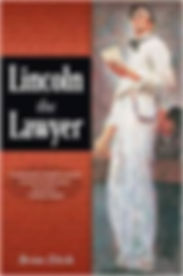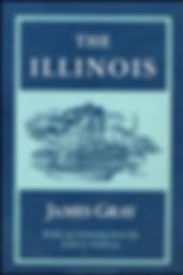Corn Kings and One-Horse Thieves
Odds & ends

Illinois past and present, as seen by James Krohe Jr.
The Corn Latitudes
“The Most Durable Ghost”
Springfield and Lincoln remain strangers.
Illinois Times
February 17, 1977
An early working out of several themes that were to recur often in my writing about Lincoln, and about Lincoln and Springfield.
For all their 140 years' acquaintance, Abraham Lincoln and his hometown are still strangers. Local scholars have squabbled for years over which of a dozen interpretations best explains the contradictions of that most enigmatic of personalities. To some Lincoln was a stern Yankee foe of slavery, to others a racist of the worst Southern stripe. Some saw him as a slick corporate lawyer whose success at the bar earned him a coveted place in the professional middle class, while to others he remained a country bumpkin with mud on his boots. To some he epitomized political ambition, while others believed him to have been henpecked by a domineering wife into a career for which he had no real appetite.
This ambiguous attitude toward Lincoln has deep historical roots in Springfield; even his contemporaries were uncertain in their allegiance to him, and gave him only the barest of victory margins in the ' Presidential races of 1860 and l864. It should be remembered, however, that Springfieldians—voters and scholars alike—have been no more divided in their opinions of Lincoln than they have been over most other public questions. The Sangamon valley marks the confluence of the two principal migratory streams that peopled pioneer Illinois in the early l800s. One of these streams carried border staters and Southerners to Illinois, the other Yankees from the East.
Each group brought with it differing views of government, God, and man. Politics was the arena in which these contending cultures fought for dominance. Not surprisingly, politics in antebellum Springfield was a high-spirited and fractious affair. Imported sectional rivalries manifested themselves in splits between Democrats and Whigs, states-righters and abolitionists, Copperheads and Union men, The gap could be measured by the distance between the two men to whom Springfield gave its political loyalties. One, Stephen A. Douglas, was short and stout, a fiery stump orator, a Democrat; the other, Abraham Lincoln, was tall and spindly, a spinner of homespun tales, a Whig and, later, a Republican. Two different men, two different cultures, and two different concepts of America.
Some historians have recognized in this cultural mix a key to Lincoln’s greatness. In his book, Here I Have Lived, which explored A the relationship between Lincoln and his home city, Paul M. Angle asked: "Could he have understood, and solved, the problem of the Border States with a quarter-century’s association with neighbors whose backgrounds and prejudices were closely akin to those of the people of Kentucky and Missouri? How much of his own cautious sureness resulted from the conservatism of these same neighbor? . . . To what extent were the Southerners of his home city responsible for his refusal to adopt a policy of vengeance towards the conquered section?" The questions provide their own answers.
The effects of Lincoln, alive and dead, on Springfield area more difficult to gauge. The economic impact, to be sure, is obvious and substantial—it is frequently charged that profit lies at the root of the city’s attachment to its martyred hero—but those looking for evidence of some ennobling influence on local political or moral life are likely to be disappointed. Many years ago George W. Bunn, Jr., himself an amateur Lincoln scholar, noted to a visitor that Springfield had not always been the sort of town Lincoln would have been proud of. True. But it has always been a town he would have understood. ●
SITES
OF
INTEREST
Essential for anyone interested in Illinois history and literature. Hallwas deservedly won the 2018 Lifetime Achievement Award from the Illinois State Historical Society.
One of Illinois’s best, and least-known, writers of his generation. Take note in particular of The Distancers and Road to Nowhere.
See Home Page/Learn/
Resources for a marvelous building database, architecture dictionary, even a city planning graphic novel. Handsome, useful—every Illinois culture website should be so good.
The online version of The Encyclopedia of Chicago. Crammed with thousands of topic entries, biographical sketches, maps and images, it is a reference work unmatched in Illinois.
The Illinois chapter of the American Institute of Architects in 2018 selected 200 Great Places in Illinois that illustrate our shared architectural culture across the entire period of human settlement in Illinois.
A nationally accredited, award-winning project of the McLean County Historical Society whose holdings include more than 20,000 objects, more than 15,000 books on local history and genealogy, and boxes and boxes of historical papers and images.
Mr. Lincoln, Route 66, and Other Highlights of Lincoln, Illinois
Every Illinois town ought to have a chronicler like D. Leigh Henson, Ph.D. Not only Lincoln and the Mother road—the author’s curiosity ranges from cattle baron John Dean Gillett to novelist William Maxwell. An Illinois State Historical Society "Best Web Site of the Year."
Created in 2000, the IDA is a repository for the digital collections of the Illinois State Library and other Illinois libraries and cultural institutions. The holdings include photographs, slides, and glass negatives, oral histories, newspapers, maps, and documents from manuscripts and letters to postcards, posters, and videos.
The people's museum is a treasure house of science and the arts. A research institution of national reputation, the museum maintains four facilities across the state. Their collections in anthropology, fine and decorative arts, botany, zoology, geology, and history are described here. A few museum publications can be obtained here.
“Chronicling Illinois” showcases some of the collections—mostly some 6,000 photographs—from the Illinois history holdings of the Abraham Lincoln Presidential Library.
I will leave it to the authors of this interesting site to describe it. "Chicagology is a study of Chicago history with a focus on the period prior to the Second World War. The purpose of the site is to document common and not so common stories about the City of Chicago as they are discovered."
Illinois Labor History Society
The Illinois Labor History Society seeks to encourage the preservation and study of labor history materials of the Illinois region, and to arouse public interest in the profound significance of the past to the present. Offers books reviews, podcasts, research guides, and the like.
Illinois Migration History 1850-2017
The University of Washington’s America’s Great Migrations Project has compiled migration histories (mostly from the published and unpublished work by UW Professor of History James Gregory) for several states, including Illinois. The site also includes maps and charts and essays about the Great Migration of African Americans to the north, in which Illinois figured importantly.
An interesting resource about the history of one of Illinois’s more interesting places, the Fox Valley of Kendall County. History on the Fox is the work of Roger Matile, an amateur historian of the best sort. Matile’s site is a couple of cuts above the typical buff’s blog. (An entry on the French attempt to cash in on the trade in bison pelts runs more than
2,000 words.)
BOOKS
OF INTEREST

Southern Illinois University Press 2017
A work of solid history, entertainingly told.
Michael Burlingame,
author of Abraham
Lincoln: A Life
One of the ten best books on Illinois history I have read in a decade.
Superior Achievement Award citation, ISHS Awards, 2018
A lively and engaging study . . . an enthralling narrative.
James Edstrom
The Annals of Iowa
A book that merits the attention of all Illinois historians
as well as local historians generally.
John Hoffman
Journal of Illinois HIstory
A model for the kind of detailed and honest history other states and regions could use.
Harold Henderson
Midwestern Microhistory
A fine example of a resurgence of Midwest historical scholarship.
Greg Hall
Journal of the Illinois
State Historical Society
Click here
to buy the book
Southern Illinois University Press
SIU Press is one of the four major university publishing houses in Illinois. Its catalog offers much of local interest, including biographies of Illinois political figures, the history (human and natural) and folklore of southern Illinois, the Civil War and Lincoln, and quality reprints in the Shawnee Classics series.
The U of I Press was founded in 1918. A search of the online catalog (Books/Browse by subject/Illinois) will reveal more than 150 Illinois titles, books on history mostly but also butteflies, nature , painting, poetry and fiction, and more. Of particular note are its Prairie State Books, quality new paperback editions of worthy titles about all parts of Illinois, augmented with scholarly introductions.
The U of C publishing operation is the oldest (1891) and largest university press in Illinois. Its reach is international, but it has not neglected its own neighborhood. Any good Illinois library will include dozens of titles about Chicago and Illinois from Fort Dearborn to
Vivian Maier.
Northern Illinois University Press
The newest (1965) and the smallest of the university presses with an interest in Illinois, Northern Illinois University Press gave us important titles such as the standard one-volume history of the state (Biles' Illinois:
A History of the Land and Its People) and contributions to the history of Chicago, Illinois transportation, and the Civil War. Now an imprint of Cornell University Press.




Reviews and significant mentions by James Krohe Jr. of more than 50 Illinois books, arranged in alphabetical order
by book title.
Run by the Illinois State Library, The Center promotes reading, writing and author programs meant to honor the state's rich literary heritage. An affiliate of the Library of Congress’s Center for the Book, the site offers award competitions, a directory of Illinois authors, literary landmarks, and reading programs.
